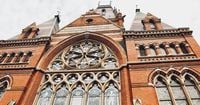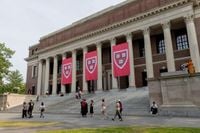In a landmark ruling that’s sent shockwaves through academia and Washington alike, a federal judge has dealt former President Donald Trump’s administration a major blow in its ongoing campaign against Harvard University. On September 3, 2025, Boston U.S. District Judge Allison D Burroughs ruled that the administration’s attempt to freeze $2.2 billion in research funding to the nation’s oldest university was a violation of the Constitution. The decision comes after months of escalating tension between the White House and one of America’s most prestigious academic institutions—a conflict that has become a flashpoint in the broader culture wars roiling higher education.
The saga began in April, when the Trump administration abruptly halted thousands of federal grants to Harvard, including vital funding for cancer research projects. Citing what it called a need to force Harvard to do more to address antisemitism and “radical left” ideologies on campus, the administration insisted that withholding the money was necessary to compel change. According to the administration, pro-Palestinian demonstrations by Harvard students in response to Israel’s actions in Gaza after the October 7, 2023, Hamas attack were evidence that the university was not doing enough to combat hate or uphold civil rights laws. The White House also threatened Harvard’s accreditation, cut off federal contracts, and even tried to block the enrollment of international students, as reported by multiple outlets.
Harvard, for its part, fired back with a lawsuit, arguing that the administration’s actions were retaliatory and infringed on its free speech rights. The university maintained that the government was trying to strong-arm it into overhauling its governance, hiring, and academic programs to align with the administration’s ideological priorities. In the words of Harvard President Alan Garber, the university saw the move as an attack on “the core principles of American higher education.”
Judge Burroughs, who was appointed to the federal bench by Barack Obama, sided with Harvard in a strongly worded opinion. She concluded that while Harvard had indeed tolerated hateful behavior for too long, the Trump administration’s campaign was less about combating antisemitism and more about waging an “ideologically-motivated assault on this country’s premier universities.” In her ruling, Burroughs wrote, “The pressure campaign that resulted in terminating Harvard’s funding did not honor its free speeches as granted by the First Amendment.” She added, “Further, their actions have jeopardized decades of research and the welfare of all those who could stand to benefit from that research, as well as reflect a disregard for the rights protected by the Constitution and federal statutes.”
The judge’s order was sweeping in its scope. Not only did she bar the administration from terminating or freezing any additional federal funding to Harvard, but she also blocked the government from withholding payment on existing grants or refusing to award new funding in the future. Burroughs emphasized that it is the job of the courts to safeguard academic freedom and ensure that “important research is not improperly subjected to arbitrary and procedurally infirm grant terminations, even if doing so risks the wrath of a government committed to its agenda no matter the cost.”
The White House was quick to denounce the decision. Spokesperson Liz Huston vowed to appeal, labeling Burroughs an “activist Obama-appointed judge” and insisting that Harvard “does not have a constitutional right to taxpayer dollars and remains ineligible for grants in the future.” The administration maintains that its actions are justified by the need to enforce civil rights laws and combat antisemitism, a stance it has used to justify similar measures against other elite universities.
Harvard President Alan Garber, in a message to the campus community, hailed the ruling as a victory for academic freedom and scientific progress. “The ruling validates our arguments in defense of the University’s academic freedom, critical scientific research, and the core principles of American higher education,” Garber wrote. Notably, he made no mention of the status of settlement talks with the administration, even as Trump had publicly stated during a cabinet meeting the previous week that he hoped any resolution would see Harvard paying “nothing less than $500 million” as it had “been very bad.”
Harvard’s legal battle is just the latest—and most high-profile—episode in the Trump administration’s wider campaign against elite U.S. colleges. As reported by multiple sources, the administration has gone after other Ivy League schools as well, framing its actions as a crackdown on antisemitism and a push to enforce federal civil rights statutes. Three other Ivies, including Columbia University, have already settled with the government. In July, Columbia agreed to pay $220 million to restore federal research money that had been denied because of allegations the university allowed antisemitism to fester on campus.
The administration’s aggressive tactics have sparked fierce debate across the political spectrum. Supporters argue that universities have long turned a blind eye to hate speech and political bias, and that federal intervention is both necessary and overdue. Critics, on the other hand, see the campaign as an unprecedented overreach—an attempt to punish academic institutions for views and activities that run counter to the administration’s ideology. The fact that Harvard’s funding freeze included grants for cancer research and other scientific endeavors only heightened the outcry among medical researchers and patient advocacy groups, who warned that the move could set back life-saving work by years.
Judge Burroughs’s ruling does not resolve the underlying issues of campus hate or the broader culture war over higher education, but it does set a significant legal precedent. By affirming that the federal government cannot use funding as a cudgel to force ideological compliance, the decision may shape the relationship between Washington and the academy for years to come. Legal experts note that the case could end up before the Supreme Court, especially given the administration’s vow to appeal.
Meanwhile, the climate on college campuses remains tense. Pro-Palestinian demonstrations, debates over academic freedom, and allegations of antisemitism continue to roil universities nationwide. As for Harvard, the university is now free—for the moment, at least—to continue its research and academic programs without the immediate threat of federal funding cuts. But with the administration promising to keep up the fight, the battle over the future of American higher education is far from over.
With this ruling, Judge Burroughs has thrown down a marker: whatever one’s politics, the courts remain a bulwark against government overreach in the nation’s universities. The outcome has left both sides gearing up for the next round, with billions of dollars and the very nature of academic freedom hanging in the balance.


